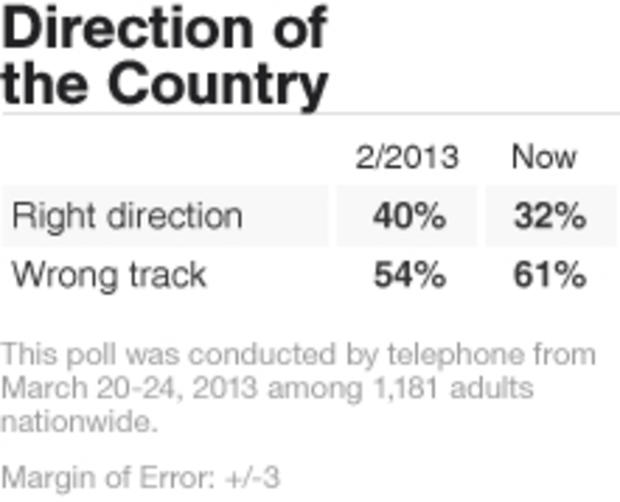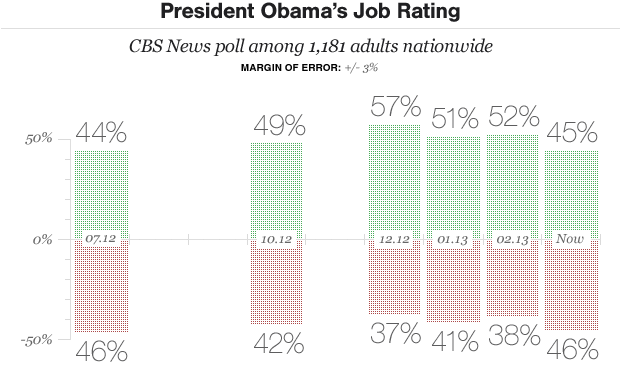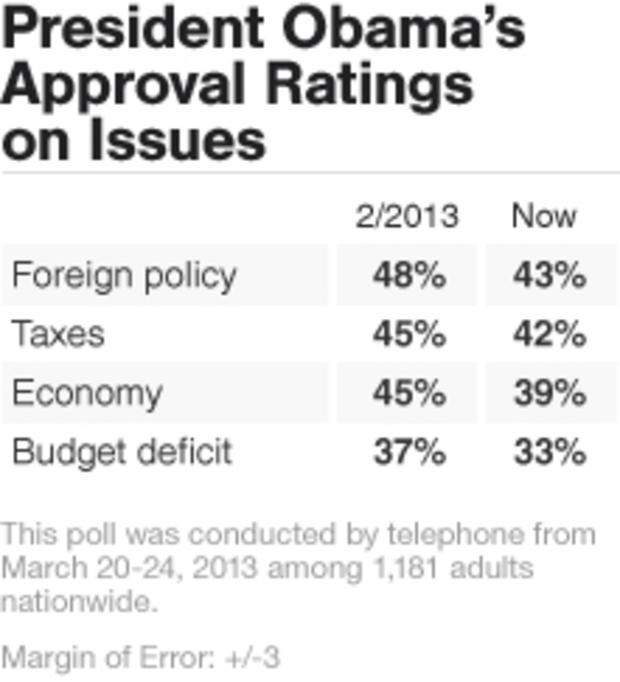Poll: 80% of Americans unhappy with Washington
Poll analysis by Sarah Dutton, Jennifer De Pinto, Anthony Salvanto and Fred Backus
Amid the debate over the federal budget and the failure to come to an agreement to avoid the sequester, eight in 10 Americans are unhappy with how things are going in Washington, including 30 percent who are angry, up nine points since December and the highest level of anger recorded since the question was first asked in 2010.
Dissatisfaction with Washington cuts across party lines, but Republicans and independents are more likely than Democrats to say they are angry.
In addition, the percentage of Americans who say the country is headed in the right direction (32 percent) is down eight points since early February. That number had been inching up recently but is now back to where it was last summer. Nearly nine in 10 Republicans think the country is on the wrong track; among Democrats, 60 percent say it is headed in the right direction.
The President and Congress
As anger toward Washington has risen, President Barack Obama's overall approval rating has taken a bit of a hit. Forty-five percent of Americans now approve of the job Mr. Obama is doing as president, down from 52 percent last month. His approval rating is similar to what it was last summer.
While the president's approval rating has been above 50 percent since his reelection, throughout much of 2012 it hovered just below the 50 percent mark.
As has been the case, most Democrats approve of job the president is doing, while most Republicans disapprove. But Mr. Obama's overall rating among independents is more negative (50 percent) now compared to last month (37 percent).
While the president's approval rating may have dropped some, Congress' approval remains near an historic low -- only 11 percent approve. Negative ratings of Congress are found among Democrats, Republicans and independents.
The president's approval ratings on some key issues have slipped since last month as well. Just 39 percent of Americans now approve of the way Mr. Obama is handling the economy -- the public's top concern - down from 45 percent.
The Sequester
Americans continue to believe the sequester cuts will be bad for the country (41 percent) in the long run, and just 28 percent expect their effect to be good for the country. However, the view that sequester will have no impact has doubled since early March before the cuts took effect, from 12 percent up to 23 percent now.
Partisan views on this are only slightly different. Republicans are mixed as to whether the sequester will be good (36 percent) or bad (36 percent), and Democrats are more pessimistic (48 percent believe the sequester will be bad). Independents are the most likely of all three groups to see no impact.
Americans assign political blame about equally to President Obama (35 percent) and congressional Republicans (39 percent) for the failure to avert the sequester.
The Deficit and its Impact
Thinking more broadly about the deficit, most Americans do not see a clear connection between a lower deficit and an improved economy. Fewer than half, 42 percent, believe cutting the deficit will improve the economy, but nearly as many - 39 percent -- say they are not sure, and another 9 percent think there would be no effect. On the other hand, it couldn't hurt: just 6 percent say it would make things worse.
Americans do connect the deficit to their family; 61 percent say it impacts their own financial situation.
Fifty-eight percent of Americans seek a balanced approach to deficit reduction, both through tax increases and spending cuts, virtually no change over the past two months.
What Cuts Would You Make?
In order to reduce the deficit, Americans are not willing to cut three major items in the federal budget: they're opposed to cutting defense (58 percent) and strongly opposed to cutting programs like Social Security and Medicare (eight in 10). They're somewhat willing to make cuts to other, unspecified programs that benefit them, but personally paying more in taxes finds little favor.
It isn't just seniors who oppose cuts to Social Security and Medicare; opposition is spread out across age groups. Cuts to these programs receive their highest levels of support - however tepid - from those under 30 (27 percent of those 18-29 favor cutting Social Security compared to 12 percent of those over 65; on Medicare 25 percent of those under 30 favor cutting compared to 16 percent of those over 65).
Americans give President Obama and the Democrats (42%) an edge over Congressional Republicans (35%) on whom they trust to handle the deficit. 15% trust neither side.
Gun Policy
Support for stricter gun control laws overall has dropped since the shootings at Sandy Hook Elementary School from 57 percent then to 47 percent now.
Partisans hold different views on gun control laws: half of Republicans want those laws kept as they are, while two in three Democrats want stricter laws.
Universal background checks for potential gun buyers continue to receive very strong support, with 90 percent in favor of that measure (similar to results in January and February). Eighty-six percent of Republicans, and 86 percent of gun owners themselves, support this proposal.
However, banning semi-automatic weapons receives far less support: 49 percent in favor, and 49 percent opposed. There are differences by party: 65 percent of Democrats favor it, but 61 percent of Republicans oppose it, as do 70 percent of gun owners. More women (58 percent) than men (39 percent) favor a ban.
________________________________________________________________
This poll was conducted by telephone from March 20-24, 2013 among 1,181 adults nationwide. Phone numbers were dialed from samples of both standard land-line and cell phones. The error due to sampling for results based on the entire sample could be plus or minus three percentage points. The error for subgroups may be higher. This poll release conforms to the Standards of Disclosure of the National Council on Public Polls.


